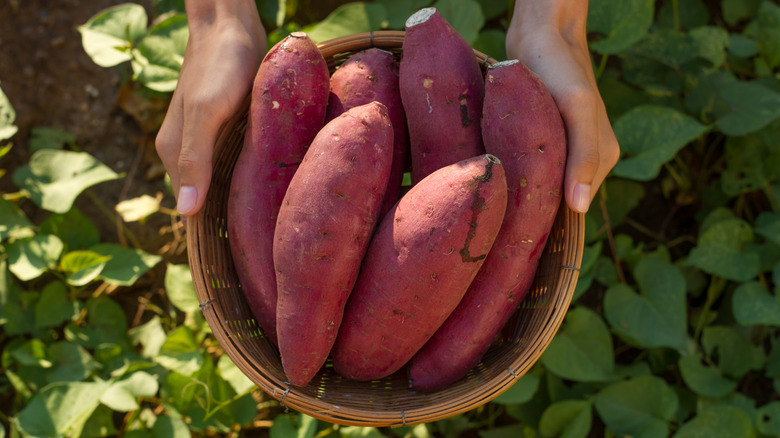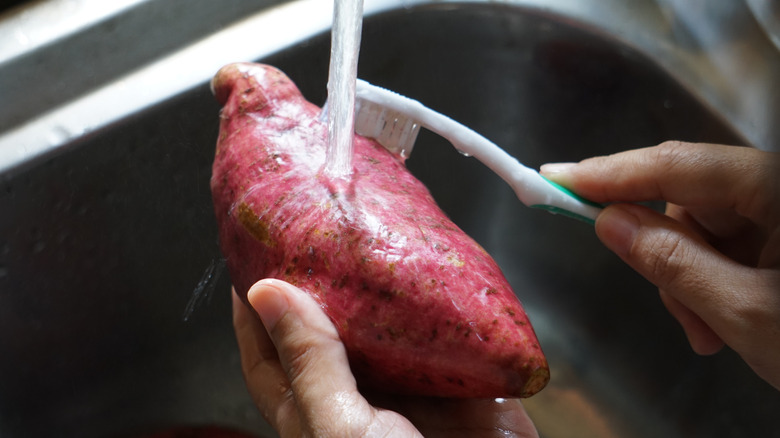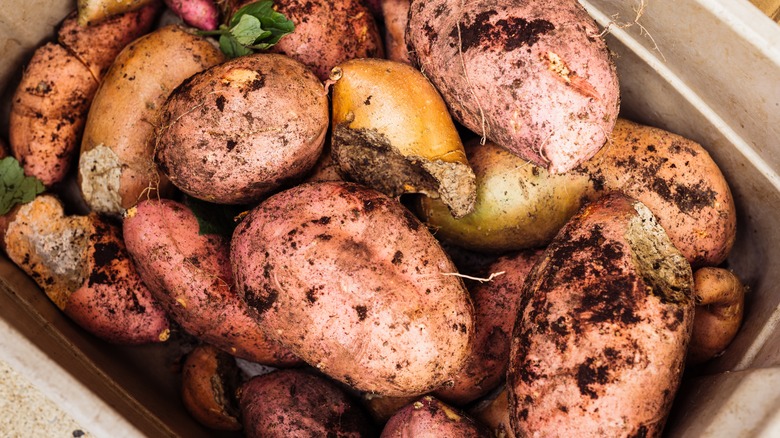How To Effectively Clean Sweet Potatoes Before Cooking
Sweet potatoes are ideal for stews, pies, salads, and casseroles, offering depth and complexity to desserts and savory dishes alike. But cooking with sweet potatoes requires some prep work. You can't just wash them under running water and then bake, boil, or fry them. Their skin can be contaminated with bacteria and pesticide residues, so you should give them a good scrub. Go one step further and soak them in water for a few hours to dislodge the dirt.
Depending on how you cook them, these starches can have a variety of textures, from creamy when mashed to crispy when roasted. Plus, you can use them as a base for sweet potato gnocchi, lasagna, or homemade bread, turn them into fritters, or add them to baking mixtures. If you're feeling creative, mash the potatoes and use them in cheesecakes, truffles, soufflés, or even ice cream.
With that in mind, here's how to clean sweet potatoes before peeling them.
The proper way to clean sweet potatoes
Generally, it's best to clean sweet potatoes right before cooking them to preserve their texture and freshness. First, wash your hands and set up a clean working area. Rinse the potatoes under warm running water to remove loose debris from their skin. If necessary, soak them in lukewarm water for 10 minutes or so to get rid of stubborn dirt.
Next, rub their skin with a vegetable brush or scrubber. The Centers for Disease Prevention and Control recommends using plain water. Soap, detergents, and other cleaning products can leave residues behind and make you sick. If you don't have a scrubbing brush, clean the potatoes with a soft toothbrush, kitchen towel, or napkin soaked in water. Alternatively, put on a pair of exfoliating gloves or use a soft sponge to scrub them.
When you're done, check the potatoes for hidden dirt and give them another rinse. Pat them dry before peeling them. If, for some reason, you can't cook them right away, place them in a bowl with water and lemon juice. This extra step will preserve their color and prevent oxidation. Cover the bowl with a lid and store it in the refrigerator for no more than 24 hours. However, beware that washing and peeling the potatoes before storing them in the fridge can alter their flavor and consistency. They might become too soft, dry, or overly sweet, or get contaminated with bacteria from other foods.
Why you should clean sweet potatoes before cooking them
Sweet potatoes can sometimes have pesticide residues. For this reason, it's recommended to rinse them with warm water for at least 60 seconds or, better yet, soak them in warm water. These starches grow deep in the ground, so they can carry all sorts of germs. Plus, they can become contaminated with bacteria during storage and transportation.
Washing alone may not be enough to remove stubborn dirt and germs. To stay safe, cut out any blemished areas and scrub the potatoes for a few minutes before peeling them. These steps are particularly important if you plan to cook sweet potatoes with the skin on (though you should clean them even if you remove the skin before cooking). Any dirt or debris left on the skin might cause uneven cooking and affect the texture of the final dish.
You might also notice a milky substance on their flesh after you cut them. That white ooze on sweet potatoes is called "sap" and consists of sugar and sap. It's actually a sign of freshness, and there's no need to wash it off. Apart from that, you should discard any potatoes with mold, soft spots, or green discoloration.


